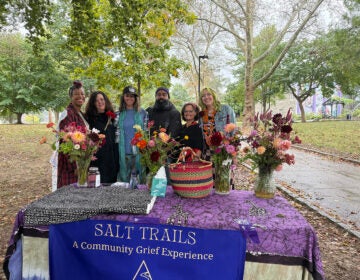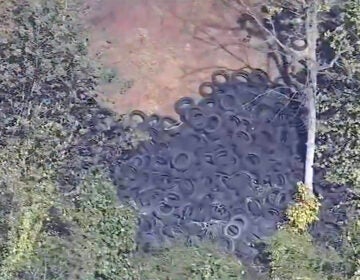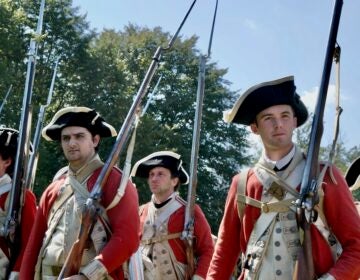Youth mayoral forum elicits ‘poignant’ response about police, community relations

Ed Rendell (sixth from left), after kicking off Monday morning's Rendell Center for Civics and Civic Engagement mayoral forum at school-district headquarters. (Brian Hickey/WHYY)
By asking five mayoral candidates a question about police brutality, a trio of Julia De Burgos Elementary School students sparked one of the campaign’s most eye-opening moments to date.
Inside the School District of Philadelphia headquarters for Monday morning’s Rendell Center for Civics and Civic Engagement mayoral forum, Armani Sanders and two classmates posed a question that, for the most part, elicted recurring responses about rebuilding relationships between police and residents.
But when it came time for candidate Doug Oliver to respond, he did so with two questions of his own for the dozens of students inside the auditorium: Show of hands, how many of you consider police to be your friends, and how many of you do not consider police to your friends?
To the first question, fewer than five hands rose; to the second, more than 60.
Reactions to the response
“Poignant,” is the word that former mayor and governor Ed Rendell used to describe it.
Oliver later said that it was a moment of “overwhelming sadness” for him.
Sensing that there might have been adult-intervention in crafting what seemed to be a loaded question, Oliver said he wanted to get a read on the life experiences of the fourth and fifth graders in the room.
“My assumption was that they didn’t [have personal experience with police brutality]. I didn’t want to poison the well, so I asked affirmatively. What I saw required the next question,” he told NinetyNine.
“When I saw all the hands, I almost lost my train of thought. If this is what you feel as fourth and fifth graders, we have a lot of work to do,” he continued. “There’s an overwhelming sadness that the seeds of bad relationships are already being planted and we have to get to work on this as early as the first grade. It’s not just the adults in the communities. These are bright kids with a positive worldview. Adults, we’re to blame for this.”
Contacted for comment about the mayoral-forum moment, Lt. John Stanford — commanding officer of the Philadelphia Police public affairs unit — said it was emblematic of the “climate of the country right now.”
“When I pick up the Daily News and Inquirer, or watch CNN or every other station out there, every story about police is negative. So, how else would you see the police?” he said.
“Just like in communities where 10 percent of the people are committing the crimes, 90 percent of our officers are doing great things day-in and day-out while 10 percent are not doing their job the proper way, abusing their power, not doing what they’re trained to do,” he continued. “It seems like these are the only people that any attention is focused on.”
Stanford noted that when it comes to building stronger relationships between police and the communities they serve, connecting with youths is key.
“We have to do more. It’s not about just not getting out and having an event, but doing day-to-day things that have to be genuine,” he said. Those responses “come back to what kids are hearing in their homes and seeing on TV. Obviously, teachers are not coming to school saying police are bad.”
The event itself
The hour-long forum, sponsored by the Rendell Center for Civics and Civic Engagement and livestreamed to city schools, featured four selected questions from among those sent in from across the district.
In addition to the one from De Burgos Elementary (Fairhill), students from Edwin M. Stanton (Graduate Hospital/South of South), William Dick (Stanton/North Philly) and John Wister (Germantown) also posed questions of the candidates.
Those questions: Why do you want to be mayor? What is the first issue you would work on if/when elected? And, how will you make our schools better?
Most responses circled back to the prominence education and education-funding have played in the Democratic primary thus far.
Among the lighter moments was Tony Williams joking (we think) that he’d lobby for longer recesses and summer vacations and Oliver asked kids to namedrop him in their voting-parent’s ears.
“The questions were great,” said Rendell afterwards. “And, it’s amazing how closely the students paid attention. No laughing. No talking during the debate. I hope it was the same in classrooms across the city as they watched.”
Philadelphia Superintendent William Hite, who was on hand for the event as well, concurred with Rendell’s assessment of the “well thought out” queries posed of candidates.
Asked what he hoped the acute attention being focused on education in the mayoral race would bring about, Hite told NinetyNine, “More investments in school. More investments in learning. More investments in teachers. Recurring revenue, so that this doesn’t keep coming up every year.”
WHYY is your source for fact-based, in-depth journalism and information. As a nonprofit organization, we rely on financial support from readers like you. Please give today.




